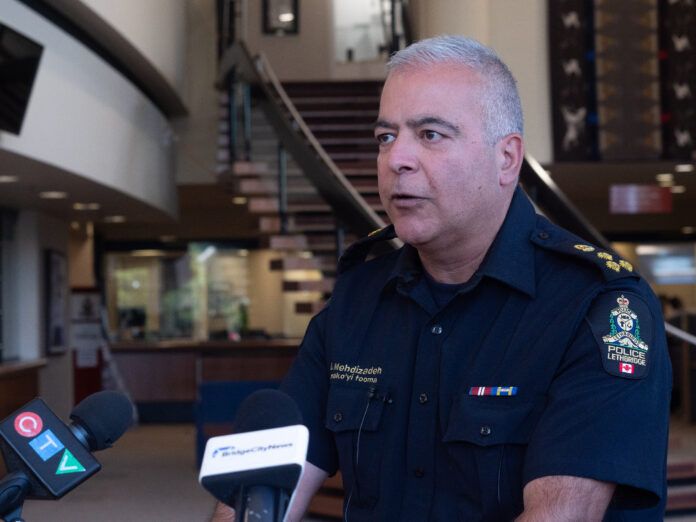“People have to know that drugs have really evolved over the years.”
That is from Lethbridge Police Service (LPS) Chief Shahin Mehdizadeh, who recently participated in the Municipal Leadership on Substance Use Summit.
The event, hosted by the Canadian Centre on Substance Use and Addiction, was held in Timmins, Ontario from September 5 to 7, 2024.
Mehdizadeh was joined by Lethbridge mayor Blaine Hyggen and elected officials from across the country to discuss challenges related to substance use.
The chief says he has been policing for over three decades, with most of that time “spent on [policing] drugs and organized crime”.
“I can remember the days when alcohol was the biggest drug issue out there and now it has evolved over the years,” says Mehdizadeh.
He notes drugs on the streets of Canada and the United States “are not like anything you have seen before”.
“Canada, for sure, is a source country for a lot of these drugs, so the days that you have to bring drugs from Mexico, Colombia or the far east, import them into Canada and distribute them – those days are gone,” Mehdizadeh adds.
“People are making synthetic drugs with chemicals that are much [more] addictive, potent and dangerous than heroin and cocaine that used to be the drugs we had issues with.”
He says despite work being done to combat drug trafficking and the potency of certain drugs and “as the solution is found for one type of drug, another drug is introduced on the streets that is actually going to bring new addictions to our individuals”.
“[It’s] all about making money regardless of how many people die,” notes the chief.
READ MORE: Eight accidental fatal drug poisoning deaths reported in April in Lethbridge
However, when it comes to solutions, “no two communities are the same”.
In the city, Mehdizadeh says the LPS has its members trained to better address issues around substance use than before.
“With the VODP program that’s funded and administered by the province, for the first time, the police is actively connecting people to treatment,” he comments.
The VODP, or Virtual Opioid Dependency Program, provides individuals arrested in Lethbridge the option to immediately consult with an addiction medicine physician.
“Before VODP, it was just a matter of putting cuffs on people, throwing them in jail, [then] they come out and they go right back into that cycle,” Mehdizadeh says.
“We are actively trying to connect them with the treatment if they choose to take that.”
He adds officers are also trained to “have more compassion” toward an individual with addiction issues, and praises services like The Watch for the work they do downtown.
TWO COMPONENTS
Mehdizadeh says there are two components when it comes to addiction.
“One is the people who are already addicted on drugs and they need the help and care to hopefully get them out of that lifestyle, but also, there’s a component of stopping the trend in the future and reducing that, which is really, investing in our youth and other components the whole city can partner [on] and try to actually stop the spread of this event [substance use issues] in the future.”
The chief says he is proud to see drug deaths fall in the region. “I don’t know what contributes to that, at this point it’s too early [to tell], but in Alberta we have seen a decrease in the number of overdose deaths, but the sad news is we are still having that.”
READ MORE: Accidental fatal drug poisonings in Lethbridge on the decline in the first part of 2024
“Everybody is trying to collect information and look at how that information can be used to come up with a solution that is actually good for that specific community to help [address] this crisis,” Mehdizadeh says.
He adds for younger individuals, the LPS has a strong existing relationship with both the Lethbridge School Division and Holy Spirit Catholic School Division.
“We had school resource officers at one point, but we changed that to youth engagement officer because we realized that the youth in the community – not every one of them went to school, and how can we actually support all the youth in the community.”
He adds the service is working with its Community Peace Officers to see how they can be utilized in school programs “so it doesn’t just need to be gun-carrying police officers” that speak with youth.
Mehdizadeh says the LPS is also focused on adding more resources to the youth engagement and downtown policing units to address issues related to substance use.







